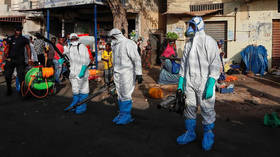- Joined
- Aug 8, 2008
- Messages
- 6,070
- Points
- 83
https://www.rt.com/news/486201-un-covid-great-depression/
Possibly ‘deepest since Great Depression’: UN chief Guterres warns about pandemic-induced economic downturn
18 Apr, 2020 09:13
Get short URL

Members of local hygiene services wear protective suits and face masks as they prepare to disinfect the street and market in Dakar, Senegal © Reuters / Zohra Bensemra

UN Secretary-General Antonio Guterres has said that the effects of the Covid-19 pandemic will massively increase poverty worldwide, as the number of confirmed cases continues to grow.
Guterres has held a virtual meeting with the World Bank and the International Monetary Fund (IMF). For the teleconference, the UN presented the secretary-general’s policy brief, in which he said the depth of the current global recession could be “the deepest since the Great Depression.”
In his brief, Guterres cited a grim report from the IMF from earlier this week, which noted that the worldwide economic downturn makes the “Great Lockdown” not only the worst blow to the world economy since the depression of 1929-39, but “far worse than the Global Financial Crisis,” citing data from 2009.
The IMF projected that even in the best-case scenario, if the pandemic fades in the second half of 2020, the cumulative loss of global GDP in 2020-21 could be around $9 trillion, “greater than the economies of Japan and Germany, combined.”
Also on rt.com WHO first? It’s time to revamp global institutions and prepare for a new post-Covid world order
The UN chief warned that while the exact impact of the pandemic on the economy will vary from country to country, “Covid-19 will likely increase poverty and inequalities at a global scale.”
In his speech at the meeting, Guterres urged the World Bank and the IMF to help in “alleviating [the] crushing debt” in developing countries, particularly in Africa.
Many sectors of the economy ground to a halt as countries closed their borders, imposed various forms of lockdown, and encouraged citizens to stay home in an effort to slow the spread of the disease. This has led businesses providing “non-essential services” to remain closed for weeks and months. In the US, the country worst hit by the pandemic, more than 22 million people have filed for unemployment benefits.
As of Saturday, there are more than 2.25 million confirmed cases of Covid-19 across the globe, according to Johns Hopkins University. More than 154,300 people have died.
Think your friends would be interested? Share this story!
Possibly ‘deepest since Great Depression’: UN chief Guterres warns about pandemic-induced economic downturn
18 Apr, 2020 09:13
Get short URL
Members of local hygiene services wear protective suits and face masks as they prepare to disinfect the street and market in Dakar, Senegal © Reuters / Zohra Bensemra

UN Secretary-General Antonio Guterres has said that the effects of the Covid-19 pandemic will massively increase poverty worldwide, as the number of confirmed cases continues to grow.
Guterres has held a virtual meeting with the World Bank and the International Monetary Fund (IMF). For the teleconference, the UN presented the secretary-general’s policy brief, in which he said the depth of the current global recession could be “the deepest since the Great Depression.”
In his brief, Guterres cited a grim report from the IMF from earlier this week, which noted that the worldwide economic downturn makes the “Great Lockdown” not only the worst blow to the world economy since the depression of 1929-39, but “far worse than the Global Financial Crisis,” citing data from 2009.
The IMF projected that even in the best-case scenario, if the pandemic fades in the second half of 2020, the cumulative loss of global GDP in 2020-21 could be around $9 trillion, “greater than the economies of Japan and Germany, combined.”
Also on rt.com WHO first? It’s time to revamp global institutions and prepare for a new post-Covid world order
The UN chief warned that while the exact impact of the pandemic on the economy will vary from country to country, “Covid-19 will likely increase poverty and inequalities at a global scale.”
In his speech at the meeting, Guterres urged the World Bank and the IMF to help in “alleviating [the] crushing debt” in developing countries, particularly in Africa.
More attention has been brought to Africa in recent weeks, as the World Health Organization (WHO) warned that the continent could be the next epicenter of the Covid-19 outbreak. Due to its weaker economies and healthcare systems, Africa could “end up suffering the greatest from a crisis that is not of its making,” Guterres said.It is not just a health pandemic. It is a jobs pandemic. A humanitarian pandemic. A development pandemic.
Many sectors of the economy ground to a halt as countries closed their borders, imposed various forms of lockdown, and encouraged citizens to stay home in an effort to slow the spread of the disease. This has led businesses providing “non-essential services” to remain closed for weeks and months. In the US, the country worst hit by the pandemic, more than 22 million people have filed for unemployment benefits.
As of Saturday, there are more than 2.25 million confirmed cases of Covid-19 across the globe, according to Johns Hopkins University. More than 154,300 people have died.
Think your friends would be interested? Share this story!
